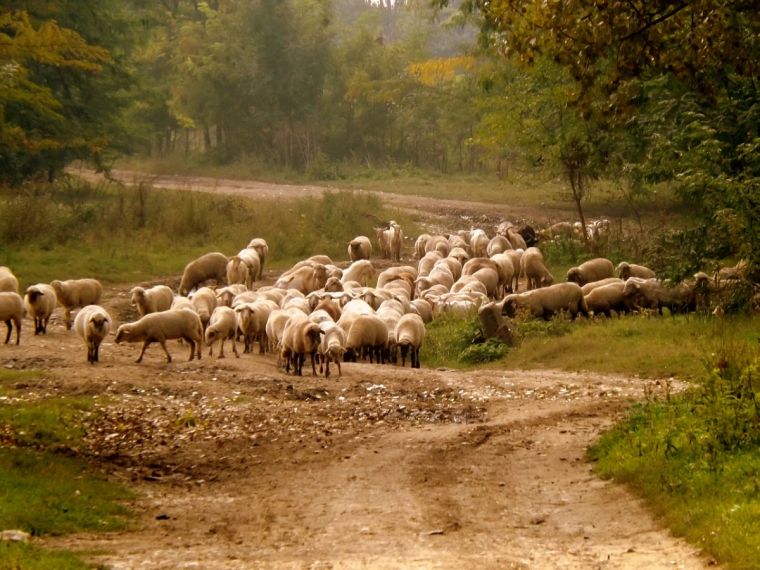Luke's Gospel: Good news for down and outs
A few years ago, a famous historic mansion near where we lived opened its doors to the public on Christmas morning – a gesture of festive goodwill to those not normally allowed in. So off we went. Afterwards I got talking to a lady who turned out to be THE Lady of the Manor. When she heard that I was pastor of a local church in the nearby town she asked in a rather posh voice: 'Is it a church for the down and outs?' Thinking of some of the congregation from pretty tough backgrounds, I initially replied, 'Yes it is.' But then a feeling of indignation arose and I blurted out: 'And you would be very welcome too!' Needless to say, she never came.

Today we consider the nativity story according to Luke's Gospel. It's a reminder that Christmas is indeed for the 'down and outs' and spiritually that means all of us. Let me explain.
Like Matthew, Luke's Gospel also includes a genealogy that traces Jesus' family tree. But Luke connects Jesus all the way back to Adam. In other words, for Luke the back story to the Christmas story is the entire human story – every human story is somehow caught up in this Christmas event.
Now speaking of Adam, back in Genesis 3 as humanity rebelled and faced exile from the garden of Eden, God announced some good news in advance. A future offspring of a woman would crush the head of the evil serpent and bring victory back to humanity. So as Luke traces the Jesus story all the way back to Adam, he is announcing the arrival of the snake-crusher. Born as a new Adam to rescue the offspring of Eve. In other words, he's come to rescue the down and outs – and that means all of us.
Luke hammers this home by introducing nativity characters that we like to imagine sporting bath robes and tea-towels on their heads – that's right, it's the shepherds. Ever got to play one of those in your school nativity? Well it wasn't a compliment! These men were considered spiritually unclean and socially disreputable. And yet guess who got to witness the most dazzling display of angelic glory – not King Herod the Great, not the High Priest, not Lord and Lady so and so but some down and out shepherds.
Suddenly, an angel of the Lord appeared to them and, after a short announcement, a whole flock of angels – not sure that's the technical term but think like a shepherd – a whole flock of angels burst forth and the night sky erupted in praise: 'Glory to God in the highest!'
Now in the Bible, angels tend to appear when God is up to something big. The term angel means messenger – they are heavenly heralds announcing major breaking news to slow-on-the-uptake humans. Many angelic visitations accompany the Christmas stories – Zechariah, Joseph, Mary and these shepherds All of heaven knows that something epic is unfolding on earth.
And what is that exactly? Well listen carefully to the angelic announcement to the shepherds: 'Do not be afraid. I bring you good news of great joy that will be for all the people. Today, in the town of David, a saviour has been born – he is Christ the Lord!'
Notice 'Christ THE LORD'. In our culture, 'Lord' can be a title for a VIP – like the house of Lords or Lord Sugar. But turn to almost any page in the Old Testament and you will find LORD in capitals. Because beneath that word is the sacred name God gave to Moses at the burning bush – often rendered Yahweh or Jehovah. This is why the angels can't control their excitement. The one born in the little town of Bethlehem is 'Christ the LORD'. The God who appeared to Moses at the burning bush is born in human flesh. In Jesus Christ, God has written himself into the story and arrived on the stage of human history: 'Glory to God in the highest!'
But here's the point. This epic, cosmic, world-changing moment was first announced to these poor, lowly shepherds. And when they hurry down to Bethlehem they find the Lord of glory wrapped in old rags and lying in a feeding trough. Can we begin to grasp the topsy-turvy nature of Christmas according to Luke? The one the angels worshipped, arrives on the scene like a down and out. Or as another verse in the Bible puts it: 'He who was in very nature God, made himself nothing!'
Let's wrap this up with a couple of practicals:
First, Christmas is a time to humble ourselves and acknowledge our need of a saviour. Before God, we are all down and outs. We have fallen a long way short of God's glory and deserve to be shut out of his presence. But in Jesus, God has stooped unbelievably low in order to lift us up. As the carol puts it:
Mild he lays his glory by,
Born that man no more may die:
Born to raise the sons of earth,
Born to give them second birth.
Hark! the herald angels sing,
'Glory to the newborn King!'
Second, given that we're all down and outs, Christmas is a great time to flatten our social hierarchies and share what we have with others. That might mean choosing less extravagant options in order to give to those in need around the world. Or it might mean inviting people from a different social background to share Christmas with us. After all if the angels invited the shepherds, if the Lord of glory was laid in a feeding trough, perhaps we could mix it up a bit this Christmas too?
Dr Andrew Ollerton is author of The Bible Course and works with Bible Society. Follow him on Twitter @andyollerton











